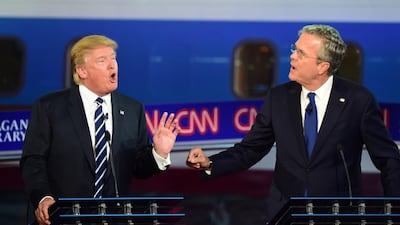SIMI VALLEY, CALIFORNIA // Front-running Donald Trump began the second Republican presidential debate with a bang, throwing his well-practised barbs in all directions, but was quiet for long stretches as 10 fellow candidates for the 2016 presidential nomination bore down on serious issues.
Standing at centre stage, Mr Trump — still a long-shot candidate for the White House — declared that he had a “phenomenal temperament” and a record in business that would help him on the world stage. The temperament of Mr Trump, who has made a series of incendiary comments about women and Hispanic immigrants, was again up for discussion during Wednesday night’s marathon debate.
Mr Trump’s unexpected rise and surprising durability is seen as a reflection of voters’ frustration with Washington and career politicians. He drew a heavy challenge from another Washington outsider with a business background: Carly Fiorina, the former Hewlett-Packard chief executive and the only Republican woman in the race.
Ms Fiorina earned praise for her debut performance in the party’s main debate, commanding the three-hour event’s first half — when the television audience was likely the most engaged. Mr Trump has become increasingly critical of Ms Fiorina as her standing has risen.
Ms Fiorina drew the night’s first loud ovation when asked about Trump’s earlier denigration of her looks; he later denied he was referring to her appearance.
“I think women all over this country heard very clearly what Mr Trump said,” she said.
Trump retorted: “She’s got a beautiful face, and she’s a beautiful woman.”
The billionaire businessman has invited scrutiny with bombastic remarks that would have undone a more traditional candidate. Mr Trump’s climb to the top of the field has unnerved Republican leaders who fear he is damaging the party’s brand and imperilling its chances of winning back the White House after President Barack Obama’s eight-year tenure ends.
Mr Trump has so far been immune to criticism for his lack of specific policy proposals, his caustic rhetoric and his uneven support of conservative principles. And he’s been unpredictable, as he was in the first moments of the debate: unprompted, Trump declared that fellow 2016 presidential candidate Rand Paul should not even be on the stage.
Former Florida Governor Jeb Bush, the son and brother of former presidents, came into the debate facing questions about whether he had the grit to take on Trump.
Mr Bush tried to challenge Mr Trump directly in the debate’s early moments but was repeatedly interrupted. As Mr Bush tried to finish an answer, Mr Trump chimed in: “More energy tonight, I like that.” Mr Trump’s jab was a reference to his frequent critique that Mr Bush is a “low energy” candidate.
Mr Bush said Mr Trump needed to apologise for bringing his wife, a US citizen born in Mexico, into a political debate. Mr Trump has suggested Mr Bush is too soft on America’s immigration crisis because of his marriage.
Mr Trump refused to apologise, stood by his criticism of Mr Bush for answering some questions on the campaign trail in Spanish and called Mr Bush “weak on immigration”. Mr Trump said people in the United States should speak English.
Florida Senator Marco Rubio jumped in and said it’s important to speak Spanish to communicate with immigrants who might become Republican voters — highlighting a priority for a party that has overwhelmingly lost the rapidly growing Hispanic vote in recent presidential elections. Mr Rubio recounted stories of his grandfather, a Cuban immigrant whose English was shaky but who idolised Ronald Reagan, the namesake of the presidential library that hosted the debate and a hero to conservatives.
When Mr Trump said he was the only one on the stage to oppose the 2003 war on Iraq, Mr Bush seized the opportunity to outline some of his foreign policy plans — and defend his brother, former President George W Bush.
Bush stopped cold and looked directly at Mr Trump, saying, “You know what? As it relates to my brother, he kept us safe.” The line earned Bush some of his biggest applause of the event.
The first question of the debate went to Mr Fiorina, who called Trump a “wonderful entertainer”.
Ms Fiorina was the debate’s newest addition after a standout performance in an undercard event last month. She sharply outlined her approach to foreign policy, citing the importance of knowing the name of General Qassem Suleimani, the commander of Iran’s elite Quds Force. Mr Trump had not known his name in an interview a few weeks ago, and appeared to confuse the Quds Force with the Kurds.
As Ms Fiorina and Mr Trump debated their business successes, they were interrupted by New Jersey Governor Chris Christie, who declared Americans did not care about the candidates’ resumes.
“You’re both successful people. Congratulations,” Mr Christie said. “The middle class in this country who’s getting ploughed under by Barack Obama and Hillary Clinton, let’s start talking about those issues tonight and stop this childish back-and-forth between the two of you.”
Mr Paul, the only candidate to directly challenge Mr Trump in the first debate, said he worried about Mr Trump as commander-in-chief. He cited Mr Trump’s “careless language” and attacks on people’s appearances.
Both Rubio and Wisconsin Governor Scott Walker, who had been seen as early favourites but lost ground as Mr Trump surged, managed to offer detailed policy proposals and criticisms in limited airtime. Mr Rubio said Americans need to ask candidates like Trump about foreign policy because “these are extraordinarily dangerous times”.
Soft-spoken retired neurosurgeon Ben Carson has vaulted into second place in the Republican race, according to polls, but had a muted performance. The political novice said he does not “lick the boots of billionaires” in one of his rare standout moments.
Other candidates included Ohio Governor John Kasich; former Arkansas Governor Mike Huckabee; and conservative Senator Ted Cruz. A preliminary debate featured four other candidates.
* Associated Press

